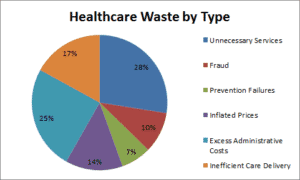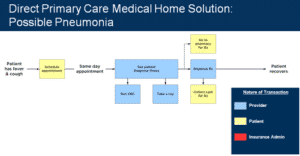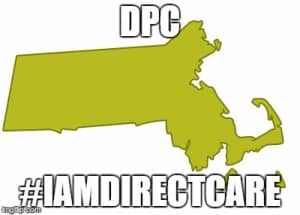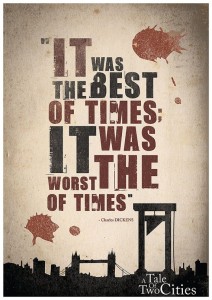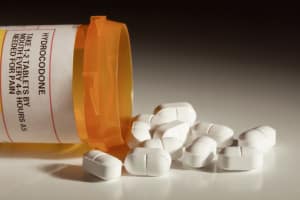Category: From Dr. Gold
Why DPC IS The Answer!
Yesterday Dr. Edmond Weisbart wrote this article for Family Practice Management (http://www.aafp.org/fpm/2016/0900/p10.html#commenting) which we posted on our Facebook page last night. He basically gives reasons why he feels DPC is not a solution to our healthcare crisis. I took the liberty of writing the below rebuttal which I have since emailed to their editorial staff for publication as well as a medical blog called www.KevinMD.com. I truly hope you will read this, and if you agree with my arguments, help us DPC doctors across the country that are trying to fight for you, our patients, and speak up to everyone. Send letters to your congressmen and congresswomen. Send it to our governor. Share it on social media. WE- patients and doctors- need to fix this as people are paying more for healthcare than their mortgages and getting less and less in return.
September 14, 2016
I am writing this letter on behalf of my fellow DPC colleagues in response to the Opinion piece by Edmond S. Weisbart, MD, CPE, FAAFP from your September-October issue titled “Is Direct Primary Care the Solution to Our Health Care Crisis?” I will be so bold as to answer Dr. Weisbarts questions with an affirmative “yes” and will try to respond to each of his bullet points. For further reading that is excellently done and supported by fact please refer to Dr. Phil Eskews piece “In Defense of Primary Care.” (http://www.aafp.org/fpm/2016/0900/p12.html)
- DPCs exacerbate the growing physician shortage: No Dr. Weisbart, plain and simply our current system is exacerbating the shortage of physicians. People who choose to go into a primary care field want to care for patients and not be burdened with an excess amount of bureaucracy that prevents them from following their oath to provide said care. One could argue that many physicians taking administrative jobs, such as a CMO of a pharmacy company, could also be contributing to the “care” shortage and access problem. Maybe we should stop doing that? And having a panel size of 2,300 patient is a good thing? If our system continues down its current path our primary care will be nothing more than an Urgent Care clinic.
- DPC’s are essentially unregulated insurance, capitating physicians and removing vital protections: Where do i begin with this one? Insurance by definition is to protect people against major financial loss for major unexpected events i.e. life insurance, car insurance, home insurance etc. Primary care is not an insurable event, as everyone needs it and should have it. Primary care is actually highly affordable, but has been made expensive BECAUSE we insure it. And the difference between captivated plans from an HMO and DPC is that there is NO THIRD PARTY determining the capitated value for the primary care services. The sole value determinant is the actual patient. What a novel concept that we have completely failed to see since third party payers have stepped into primary care. You know? To help weed out those greedy PCP’s- compared to the affordable premiums people (many with chronic disease) are paying to to carry, only to have 3,000-6000 deductibles and zero transparency on pricing for outpatient services in the third party system. Plus, if providing your technical skills and knowledge for a set monthly fee is unethical or illegal, then why can lawyers, accountants, etc do this everyday? And as far as your HIPAA concern, in true DPC guess who has access to the patients file? me and the patient!. Thats it. No one else unless its the patients choice. Can’t get more private than that can you? If I do sell patients info to vendors I am pretty sure my state BORIM and the exodus of my patients will regulate me sufficiently thank you very much. No other third party or acronym needed for that.
- DPC relies on an erosion of medical benefits: Lets look at your first sentence. The under-utilization due to HDHPs is actually due to the fact that people have no access to transparent care due to this third party payment cartel we have abided by for decades. Secondly, the current system is THE “hardship to patients” because it is an over regulated Gordian knot. DPC is accessible, affordable, and transparent with discounted pricing on imaging, labs, and meds in most states- i.e. those that allow dispensing. We actually help patients navigate this nebulous system, save them money, and yes, get them to specialists when needed with less fragmentation of care through better communication with said specialists. The only thing that makes specialty referrals difficult is the insane red tape that already exists (ie HMO patients needing an “in-network PCP” as their gatekeeper. So much for being “locked in” to something right?) We also use services (at no extra cost to patient I may add) like RubiconMD that reduce a lot of unnecessary speciality referrals that the 8 minute visits in our current system exacerbate. Also, many specialists will also see patients for a cash price if uninsured or underinsured. Thirdly, as far as employer plans go, the employers allow their employees to choose their own physician. DPC is offered as an option, not a mandate. They still have insurance, albeit with copays and deductibles, if they choose to have a PCP in the 3rd party system. So that statement is completely erroneous.
- DPCs exacerbate disparities in care: I will simply ask this in rebuttal- instead of citing studies. Have you actually visited a DPC practice and spoken to the patients that are members? Yes, the wealthy can afford anything. But what about all of those people you mentioned in paragraph 2 of section 3? A 90 dollar lipid panel at a hospital based lab is better for a blue-collar patient/family than a 75-95 dollar a month primary care medical home with no copays/deductibles and a 6 dollar lipid panel? Do the math. And as far as your inference to “cherry picking” patients with chronic diseases such as diabetes- that is just completely false and presumptuous. If anything, myself and my colleagues have many patients whom the current system has completely failed. But again, maybe you should actually speak with some DPC patients? Many of us actually have Medicaid patients. Being “insured” does not equate to actually receiving “care.” I will even provide charity care for those truly in need. Maybe policymakers and Medicaid administrators would actually work with us to make the model more accessible to Medicaid patients? Maybe the government could give those patients a voucher card for DPC no different than they do for food stamps etc?
The bottom line Dr. Weisbart is that nothing we have done or continue to do with this top down approach to fix our broken healthcare system is working. We have many administrators, policymakers, and CEOs telling us how to fix this and plugging fingers in the dyke that is ready to collapse as people pay more for insurance than they do their mortgage! So why don’t we try listening to the doctors and patients that have become the blips in the matrix on how to fix this mess for a change? The best solution to a complex problem is often the simplest. Remember Occams razor?
Sincerely yours,
Jeffrey S Gold MD
Owner/CEO Gold Direct Care PC
123 Pleasant St Suite 105
Marblehead MA 01945
DPC Coalition Steering Committee Member
To Rent or To Buy: That is the Question
Depending on your age and income, and whether or not you are shopping for a car or a place to live, the answer to this question may vary. If you enjoy getting a new car every few years then leasing is clearly the way to go, but if you really like your car then buying would be the better choice. You will likely take better care of the car because you actually own it and have zero interest in having to make new car payments once it is fully paid. Same goes for renting an apartment versus buying a home. When you rent you are just simply handing over money to a landlord to live there. There are benefits to it such as maintenance and landscaping being covered, and if you only plan on being there a short time then renting is a great idea. However, if you are looking to have a long term or permanent place to live then buying is the way to go. You are investing in the roof over your head, your yard, and the upkeep of your property. In the long run it is a much better investment.
See chart from Trulia.com here for a visualization of how buying saves in the long run:
So I ask this question: why would anyone not want to do this for their healthcare, especially primary care which is the heart of medical care? This is nothing against the many great physicians that are employed and contracted with 3rd party payors, but when your primary care physician is being paid by a third party you are technically renting/leasing them. Maybe they will drop or be dropped by that third party? Maybe they will burn out and fade away which is happening all across the country? Maybe you will get lucky and just like the old days they will stay in one place and be contracted with your third party payor for years to come? Yes they took an oath to care for you which they do to the utmost of their abilities, but technically, given that they are being paid by their employer through your insurer they aren’t technically working for you
So what if you could own the relationship with your primary care physician and have them work only for you rather than leasing it? What if you- the patient/consumer- were the only party determining the worth and value of your doctor and the care that he/she provides instead of a third party that knows zilch about you as a person? What if you could have a mutually beneficial relationship with your personal physician based on respect and trust that exists in sickness and health? And what if you could have all of this investment for less than a coffee a day? After all isn’t your health, peace of mind, and wallet worth the investment? If the answers are yes then Direct Primary Care is here and here to stay. Lets take primary care and medicine back one doctor and patient at a time. You can rent DPC for a year and if you really like it- just like Chevy Chases’ rubber gloves in Fletch- it comes with an option to buy 🙂
Our Obesity and Healthcare Epidemics: How They Go Hand in Hand
We all should know by now that we have a major obesity epidemic in this country. The best way to reverse this epidemic by controlling our weight and reducing our risk of diabetes, high blood pressure, and vascular disease is by eating real, unprocessed food. Doctors, nutritionists, and other healthcare providers often advise patients to shop the periphery when in a grocery store. Why? Because that is where the real food is. That’s where the produce, the real dairy products, fish, chicken, and meats are. Now, not all of these are truly healthy products which is beyond the scope of this post, but you catch my drift. If you shop the aisles and try to read the nutrition facts you will see my point. For example here is the nutrition info for Cheerios with Protein:
This may seem healthy on the front but look on the back and see that there are 41 grams of total carbohydrates and 17 grams of sugar! Even more interesting to point out is why is sugar one of the few items that does not have a daily percentage value next to it? Hmmmm…..Obscure. And look at the number of ingredients listed- most of which can not even be pronounced. All in all….not good and certainly not healthy. Real food is always the better option.
It is also recommended to try to cook and eat as home a much as possible to help you get or stay healthy. I am by no means a master chef but based on my experience whenever I have tried to make some complex recipe with a lengthy list of ingredients it has turned into a complete inedible mess. Ask my wife about the spice-rubbed pork tenderloin from Epicurious I tried to make a few years back…god awful. Yet, every time we use a recipe from Cooking Light it comes out great. There are fewer ingredients and fewer steps for one to screw up. It is simple, healthy and usually quite delicious. I’ll leave the complex recipes and dishes to the master chefs.
Hopefully by now you can see how this is going to tie in to our Healthcare Epidemic. Our system has become so bloated and complex with way too many needless ingredients and cooks in the kitchen that we can’t get out of our own way. See the proof here as our own state of MA spends 40% of the budget on Healthcare at the expense of other important needs:
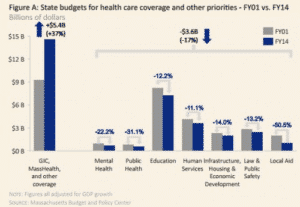
While we keep adding layers of red tape and bureaucracy, as well as continuing to allow third parties (government and insurers) to set quality measures, create networks (i.e. doctors and hospitals whom you can and can’t use), and set nontransparent prices, the doctor/patient relationship- you know… where the actual care and medicine takes place- will continue to suffer. You will have less access, longer wait times, less time with your doctor, and more visits to an Urgent Care clinic. Is that really what people want for their healthcare?
In conclusion, healthcare- especially primary care- does not have to be so expensive and complex if we just get rid of the wasteful ingredients. Let the patient, the actual consumer of the service/care, determine value and not a third party whose goal is profit and profit only. Let insurers be true insurers. Let government provide financial aid to those whom truly need it, but stop practicing medicine. Let the doctors practice medicine without layers of regulation and trust me, the bad ones will show themselves. In healthcare, just like with nutrition, the saying “less is more” could not be more appropriate. Just look at these these diagrams to see how DPC changes the recipe. *mic drop*
A Win For Gold Direct Care and DPC in MA
Direct Primary Care is written into the Affordable Care Act as an approved method of receiving primary care as long as it is combined with a catastrophic insurance plan. (Isn’t that how insurance is supposed to work? But I digress.) The ACA clearly defines that DPC is not “insurance” and purchasing a DPC membership alone does not meet the standards of being “insured.” It is required to purchase at least a high deductible insurance plan along with it to be qualified under the ACA. See great article on this here: DPC Clause in the Affordable Care Act
However, on the State level, many legislators, policy makers, and Department of Insurance commissioners want to claim that DPC is the “business of insurance” and should have to pay licensing and regulatory fees. In other words, paying a reasonable monthly fee for all your primary care needs should be regulated no different than Blue Cross Blue Shield, Harvard Pilgrim, etc etc. Having to pay fees of this magnitude would clearly put a small DPC practice like us out of business. We are not “insurance”. We are a primary care medical practice that chooses to work solely for our patients- not third parties- and therefore be compensated by our patients for what we believe is a reasonable monthly fee. About 15 states in the US have now passed legislation stating this as law. Massachusetts is not one of them and has yet to introduce a bill that by stating such protects us and our patients who choose us. We, along with three new DPC practices in MA, are tirelessly working on getting our legislators to listen to us and sponsor a bill.
As the first DPC practice in MA we were contacted by the Massachusetts Department of Insurance when we first opened in January 2015. With our legal counsel we have met with them and corresponded with them on this issue. It has been months of waiting and practicing medicine in an unclear regulatory environment. This weekend, much to my delight, I was contacted by my attorney with a letter from the DOI that has given us the green light to continue practicing medicine without 3rd party interference. (The letter is attached below a sit is a public document.) We are very thankful to Commissioner Daniel Judson and Deputy Commissioner Kevin Beagan for their understanding that what we are trying to do is solely for the benefit of the people of Massachusetts and the primary care doctors who want to care for them in a manner that echoes the “olden days of medicine.” Hopefully there are better days ahead for healthcare in Massachusetts. (more…)
It Was the Best of Days and the Worst of Days
Last Wednesday, January 6 2016, was a day I will not forget any time soon. It was a day that showed me the worst of our healthcare system but also the best. The week prior, a new patient enrolled with us online. His name was not one that was familiar to me. We scheduled him for a full checkup the next week. Patient X is a 29 year old male chef that found me online because he had no health insurance and was looking for an affordable entryway into our healthcare system. He had applied for Medicaid but was waiting on confirmation. He is a hard working, honest guy that could not afford to purchase any of the “affordable Obamacare plans” on the exchange. Luckily, he did qualify for subsidies to get MassHealth but he was not confirmed at the time of our visit. For this, I will thank Obamacare. It is not bad in every way.
After my nurse put him in the exam room and got some information on him she came back to my office to tell me about the multitude of symptoms he had been having for the past 4-6 months. These symptoms had worsened over the past few weeks and finally prevented him from working. These symptoms included left sided headache with blurred vision in his left eye, bilateral hip pain, back pain, some weight loss, and an enlarging lump in his testicle which he attributed to an enlarging benign cyst that was diagnosed by another physician years prior. Clearly he was anxious and you know what? So was I.
As I entered the exam room I was greeted by a tall, slender and very personable young guy. We walked through the details of his symptoms and the time course. I encouraged him to relax and take his time since with Direct Care there is happily no more rushing through the mill. Needless to say his story was very concerning to me and it was amazing to me that this guy was able to perform labor up until two weeks prior, especially since the pain was keeping him up at night. After his history, I conducted a thorough head to toe exam. He only had minimal neurologic findings. When he was lying down so I could examine his abdomen I could see a large left sided mass in his groin under his shorts. Sadly, all the worst-case scenarios that were running through my head were now close to being confirmed. As he stood up and lowered his shorts I was presented with the culprit- a large left sided testicular mass with swollen nodes in his groin- i.e. it had already spread and now I was concerned that all his other symptoms were manifestations of the same. This was not an easy conversation to have but I sat with him and relayed my concerns.
So the first worst part of the day was seeing this guy suffer with awful symptoms for so long without engaging our system. Was it fear of illness that kept him away? Fear of cost? Denial? Truthfully it was probably a combination of all of the above. The hard part for me was seeing the regret on his face. I tried to reassure him that what is done is done and we can not go back in time, but that we need to deal with the here and now and move forward. And so we did.
So now for the best part of the day. Within 20 minutes our wonderful insurance broker, George Claassen, came over to the office to meet with Patient X and get his insurance confirmed, as I knew he would be heading for extensive and expensive treatment- the stuff for which insurance should be used. While he met with George, I was on the phone with a great local urologist who agreed to see the patient that afternoon and was willing to do a cash price for him if needed. Following his visit the patient called me and told me it was advised that he would need CAT scans the next day prior to urgent surgery that was scheduled for Friday AM. Thank god we got him on insurance right?
That is until he told me that his new Medicaid plan would not cover the CAT scans- CAT scans ordered by a specialist with years of experience that is CONTRACTED with MassHealth!- the second worst part of the day. He was told by the schedulers at the hospital that the order needed to come from a MassHealth PCP! What planet am I on? A specialist nor an MD who diagnosed his condition can’t order an outpatient scan because of what?… Bureaucracy of course. I will not bore you with more details as the situation ended up working out and he got his scans the next day- which sadly showed spread of disease to bone, brain, nodes etc- and he had surgery last Friday. He is now in the hospital with a long arduous road ahead while he awaits chemotherapy. His pain is under better control and all we can do now is hope that his strong constitution and will to get better will guide him to being fully cured. But did he really need the two hours of aggravation after being told he had bad disease?
So like I said…it was the best of days and the worst of days all wrapped into one. It glaringly showed the positives and negatives of our system in the USA. All I hope for is the “best of days” when I can say that Direct Primary Care- for 50$ a month- saved the life of a really nice, polite, hardworking, appreciative, 29 year old year guy. It is an honor to be his doctor.
Disclaimer: this was written with the patients consent and he approved its content prior to posting.
Opiates: A Painful Topic For Everyone
Todays Boston Globe has an article regarding physician prescribing of opiates to patients that have already experienced an overdose Opiate Prescribing to Patients With OD History. Between the documentary that HBO aired last night regarding the opiate crisis on Cape Cod and this article from today, I felt that as a primary care physician and as a resident of a seemingly “white-picket fence” suburb of Boston that has experienced its own opiate epidemic with the loss of too many good people- many of them kids-to this illness, it was worth commenting on. Many of these kids and young adults I knew and even played street hockey with as a kid. Others I did not know at all, but I can feel the loss when something like this happens.
I am not an Addiction Specialist or a Psychiatrist but as a Family Physician we do often deal with these issues and are usually the front door to the healthcare system. I have treated many patients that struggle with the disease of addiction and it is an extremely complex disease that is extremely difficult to cure and it usually coexists with other mental health diagnoses whether it be ADHD, major depression, anxiety disorders, bipolar disorder etc etc that add to the challenge. The hardest part of the disease to address initially is the denial. As a key cog in the wheels of this disease, denial is the toughest nut to crack. Just like any other chronic disease we treat, patients have to come to some degree of acceptance to move forward, and with addiction denial prevents this from happening easily. Sadly, we have no idea when that bridge of denial will be crossed and what the outlook on the other side looks like, but it needs to be crossed nonetheless.
I may be an idealist at heart and obviously have my biases, but I think one key solution to this epidemic is better primary care. People that struggle with the disease of addiction obviously need a multidisciplinary approach- one that includes doctors, nurses, social workers, counselors, addiction specialists etc- but they also need a primary care doctor that can help them navigate this messed up system, be the teams quarterback, and most importantly know them and treat them as a human being rather than just a “disease”. We need to ask the hard questions such as “with all the stories and news out there on this issue, what drove you to take that pill that started it all? what support system if any do you have? how can WE help YOU get healed? How do we as a community band together to educate and support our kids in a nonjudgmental supportive way? What are WE as a community doing wrong?” It isn’t all about the actual drug or the patient and the choices they have made. Its an US issue because it could be any of our friends, family members, or children that can succumb to this disease. And I don’t know about you but aren’t you tired of reading these obituaries week after week?
Our primary care system and mental health system need an overhaul for many reasons, but this epidemic is a big one. All patients of all socioeconomic backgrounds that struggle with this awful illness deserve better than 15 minute visits. They deserve better than more pills thrown at them. They deserve a relationship that is based on trust, care, and respect. What if the doctors that were studied in the aforementioned article had time to research records and databases during these visits? What if they actually had time to call other members of the patients care team? What if they had time to discuss the risks, benefits, and alternative options for pain management with their patients with appropriate, close followup and communication? I can personally attest to the fact working in the Direct Primary Care model has allowed me to treat patients with addiction 100% better. I have the time to listen, call other resources if needed, and followup frequently by phone or email. I am by no means perfect and do not always have success sadly. Yet there is one thing that DPC has allowed me to show the patient who struggles with addiction that all the Continuing Medical Education and seminars in the world do not even touch on and that is……that I too am an imperfect human being, that I do care, and that there is hope. I know this idealistic view will not solve the whole crisis, but maybe infusing some humanity towards these patients is a good start towards helping them heal and live a healthy life? What we are doing certainly is not enough and to me that is unacceptable.
Happy Thanksgiving- A Honest and Heartfelt Thank You Note
It amazes me to think that at this time last year, though Gold Direct Care was so close to becoming a reality, it was still in many ways a figment of my imagination. So it is in a state of disbelief and gratitude that I’m writing this post, focusing on what I am thankful for this holiday.
I chose to leave the “established healthcare system” after 10 years of practicing in it, because I knew there had to be a better way to give and receive care. The two key groups of people who actually make the healthcare system breathe- the doctors and the patients- deserved so much more and so much better. I realized the only way I could possibly make a positive change and deliver care in a better way was to leave the existing, broken system and hope that others would follow. I hoped the level of care and the relationships I had nurtured with my patients would trump the admittedly steep curve of subscribing to a new model. As I well know, change can be hard even when it is a positive one. Despite huge opportunities for cost savings ( read post by Dr Patrick Rohal from Lancaster PA here: Why In the World Would I Pay TWICE for Healthcare), I worried it might be difficult for my patients to feel comfortable paying out-of-pocket for some services. Then again, I also figured so many people would be thrilled to regain control of their health care and health care dollars that they would jump at the chance to improve on our existing, personal doctor-patient relationship. People seemed to crave “old-school” medicine. I heard all around me patients talking about the value of “good” health care – this made sense.
It was never out of egotism, rather out of the work and care that I had given to my patients that made me believe a significant number would follow me. I had 2,500 patients or so on my “panel” and knew that I would need around 700-800 to make a Direct Primary Care practice sustainable. So, in the first couple of months, when only a hundred or so patients moved to the new practice with me, I wondered if I had been wrong. Had I deluded myself into thinking I was more valued by my patients than I actually was? Did people truly want a better relationship and more access to me as their physician, or is that just trendy to say? Were people honest when they talked about how important excellent care was to them? Had I misread everything?
I had invested so much into my patients and tried my best to develop real relationships with them, albeit in rushed 15-to-20 minute “traditional healthcare model” intervals, that I believed the same was felt on their part. See, what I always valued most was not my salary, but the privilege to take care of people. Yes, I like money just as much as the next person but let me tell you, med students do not choose a career in Primary Care for money. They choose it for the relationships with people. That’s why I chose Primary Care. I wanted to develop real, longitudinal relationships with my patients and truly care for them…providing that real value that they were saying they wanted and that everyone deserves.
But at the end of the day, value is determined by how much we are willing to spend on something. And so from January through about April of this year, I felt quite devalued as many of my patients elected not to pay out of pocket to keep me as their doctor. I share this, not to make anyone feel bad for making that choice. People have a variety of reasons for the choices they make- especially in a scary and complex industry such as Healthcare- but it was quite hard not to take this choice personally. I mean, medicine, particularly primary care, is personal after all. So please understand that I share this solely as an honest description about what I felt and how I viewed things at the time. I have looked at this from all perspectives as I too am a patient after all.
When pricing for my services, I tried to be as reasonable as possible without selling myself too short. I wanted to be accessible to my patients while developing a sustainable business model that supports state-of-the-art facilities and equipment, an unbelievably convenient location and – most importantly – time. If I was to be the change in the broken system, I needed to make sure the new model was set up to allow me and a growing team the time to nurture patient relationships and provide real primary care. The end result was that I settled on a maximum of 125/month, which is less than most monthly cable bills and a coffee a day if you look at it from a dollar perspective. Surely people who had been crying out for better care, better access, better Doctor relationships, less wait times, less frustration, less – well – crap would consider this a huge value. So to put it bluntly and honestly, I often felt heartbroken during those months.
After those few months of feeling sorry for myself, focusing my energy on why I now had a huge population of “former patients”, and continuously asking myself , “did I make the right choice here?” I realized it was time to move on. It was time to focus on my mission of promoting the Direct Care model, and working to introduce my practice to new patients. Even more importantly, it was time to spend all of my energy on the 100 or so people that chose to come with me. They deserved what I promised them; it was this core group of people that would determine the success of my practice.
There was never one specific moment or incident that occurred to help me turn that corner and refocus. It was a gradual process of becoming a business owner for the first time in my life and really just growing up. I focused on the positives of the change- such as new patients excited to come on board, seeing more of my old patients trickling back to me, and enjoying my ability to actually doctor in the manner I always wanted.
So here I sit, writing a long thank you note on Thanksgiving Eve to those 100 or so patients that stuck with me right from the start. I hope you read this so you can truly know and understand how thankful I am for you seeing the value in keeping me as your doctor and in my lofty endeavor of fixing a truly archaic and dysfunctional system. It is because of early adopters like you that my practice is growing and thriving. It is due to your willingness to go against the grain that we now have Dr. Mancini with us. It is certain people who dropped a Medicare HMO plan to switch to regular Medicare so that they could keep me as their doctor that helped heal a broken heart and revive my belief in the value I provide as a Primary Care physician. I am so thankful to you and the rest of the Gold Direct Care patients for believing in me and for taking the first step towards a better quality, more humanistic, and ultimately a more affordable healthcare system.
Thank You. Thank You. Thank You.
And finally…a big thank you to my nurse Meghann Dunn who was there from the beginning because she believed in my mission. Our patients and I are very lucky to have her.
Now feel free to go stuff your face with turkey and loads of carbs. Happy Thanksgiving to you and your families!
End of Life Care: We Can Do So Much Better (Dedicated to Wilbur)
Ever since I watched my grandfather and grandmother suffer from devastating diseases like diabetes and dementia, I have always been passionate about how we treat people at the end of their lives. With all of the technology, specialized medicine, and wonderful hospitals we have in this country we often never know when it’s time to stop using them. As physicians, we are so afraid of losing patients (i.e. failing), and death and dying in general, that we often lose sight of “life and living”. Sometimes the best medicine is to not only let people go, but more importantly to let them go on their own terms.
Yesterday, I lost of one my longtime patients and supporters- Mr. Wilbur Basset at the age of 89. (I am using his name and picture with permission from his family.) Wilbur and I met when I first moved to practice in Marblehead 8 years ago. What struck me about him was both how healthy he was for an older man, and even better how incredibly sarcastic and funny he was. I always enjoyed that he was for lack of better terms “a curmudgeon”. He never complained unless something was truly bothering him. It took 8 years, and me removing myself from the factory mill of modern day healthcare in order to move to the Direct Care model, for me to actually meet his family and spend time with them. I am so glad that they stuck with me and gave me the chance to show them what medicine can be like.
Unfortunately, over the past few months Wilburs illness and condition worsened. I saw him in the office with his daughter a few weeks ago and I could tell that he was declining. Given how stubborn he was, he always fought through stuff, but this time he just looked different. As I helped him in the car he said “I am so ‘blanking’ done with this.” I just knew he was ready. So after his daughter and I had a great chat about consulting with Hospice, he sadly ended up in the hospital before we could get the consultation scheduled. When I visited him there I could see how miserable he was. After a week or so, which of course included a few unnecessary consults, he rapidly worsened and was transferred to the Kaplan House where he peacefully passed away with family by his side after a day. Fortunately I got to say my goodbye to him yesterday.
As a system, we have to do better for patients like Wilbur and their families. We must do better. For me, I will always remember him the way he was a few weeks ago, and I will always be thankful to have had the opportunity to care for him and his family through his journey. I may not be a specialized surgeon or a cancer specialist, but I am so thankful that Wilbur and his family went Direct Care with me and granted me the most gratifying job in the world. I was his doctor.
Rest in peace Mr Bassett. You have earned it and did it on your terms.
Reasons # 2 and 3: Happy Birthday
I want to dedicate this entry to my now 6 year old twins- Cameron and Isabella. It is amazing to me that time is going by so quickly and that you two are already 6 years old! It seems like just yesterday we were learning how to give you your first baths, and now you are in Kindergarten learning how to write and count. You are now talking back instead of just screaming….although often there is still some screaming. Your are playing soccer, learning how to skate, tumbling, building legos, and all of these other amazing things that are so enjoyable to watch. Yet, most importantly, you are constantly inspiring me to be a better person.
You are a significant part of the reason why I left a well-paying job as an employed physician to put us in debt and start this practice. I know its often hard when I am working many hours trying to take care of patients or working to grow this business, but I want you to know that you are why. I love when when you both ask questions like “how was your patient?, are they ok?, did you get any new patients today?” It shows me that we have taught you to care! In the crazy world we live in we are often bombarded with ugliness and what people are doing wrong. I want you to have a dad who shows you what is right. I want you to see that doing the right thing is not always easy and that people may act like you’re crazy, but to keep doing it. Do not give in to naysayers and fight for what you know and believe to be right. If you do these things you will never fail. You may have to “regroup” and find other solutions sometimes, but you will never fail.
As one of my boyhood idols Wayne Gretzky once said: “You miss 100% of the shots you never take.”
So always take the shot- or at least pass it to someone who has a better scoring chance. And thank you for driving me to be the type of doctor, father, and person that I want to be. As much as I love medicine, I will always love you guys more. I hope you always know that. So Happy Birthday and enjoy the gifts that you will play with for 5 minutes and then never touch again 🙂
ICD-10: It’s Nice Not Knowing You
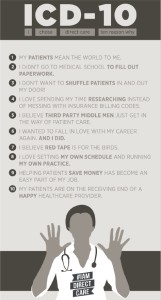
Today, October 1st 2015, is a very critical day for the “disease management” system that we mistake for a healthcare system in the United States. Today is when the new coding system called ICD-10 goes live for a majority of American physicians and Nurse Practitioners. This is nothing more than another layer of bureaucratic red-tape that does nothing to enhance the quality or cost of your care, but rather furthers the disease process. All it does is waste more of your physicians and office staffs time- time that should be spent working towards your care. Instead it just feeds an already broken machine that is aimlessly running on fumes while blowing exhaust into the faces of the people whom matter most- the doctors and the patients.
Luckily for us and other brave practices and patients across the nation, we have nothing to do with this nonsense. We have decided to escape the mess and fix medicine from the ground up. Our focus is solely on working together towards a system that actually makes sense and works for our patients. This is what gratifies us most- being able to provide care the way we trained to do. So help us raise awareness about the Direct Primary Care model today- National Direct Primary Care Day! Check out the following link, share it, talk about it, and maybe even buy a t-shirt:
And finally, here’s to being part of the solution rather than adding to the problem. We thank you for your support and for being willing to do one of the hardest things for anyone- change.




